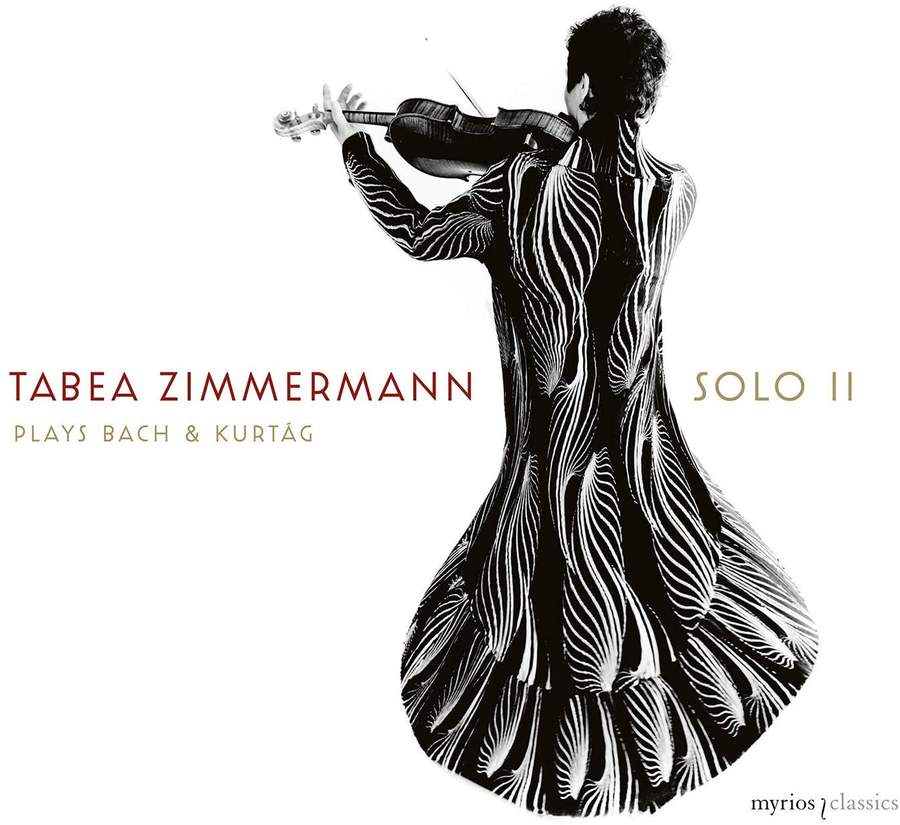Tabea Zimmermann: Solo II
View record and artist detailsRecord and Artist Details
Genre:
Instrumental
Label: Myrios
Magazine Review Date: 12/2020
Media Format: CD or Download
Media Runtime: 52
Mastering:
DDD
Catalogue Number: MYR026

Tracks:
| Composition | Artist Credit |
|---|---|
| (6) Suites (Sonatas) for Cello, Movement: No. 3 in C, BWV1009 |
Johann Sebastian Bach, Composer
Tabea Zimmermann, Viola |
| (6) Suites (Sonatas) for Cello, Movement: No. 4 in E flat, BWV1010 |
Johann Sebastian Bach, Composer
Tabea Zimmermann, Viola |
| Signs, Games and Messages, Movement: Excerpts |
György Kurtág, Composer
Tabea Zimmermann, Viola |
Author: Lindsay Kemp
It was in 2009 that Tabea Zimmermann released the first two of Bach’s Solo Cello Suites alongside Reger’s three on a disc that Duncan Druce described as ‘magnificent’ (A/09). Now she’s back with the Third and Fourth Suites and an even more imaginative coupling: six of the brief but intense Signs, Games and Messages György Kurtág has written for musical friends. Often little more than a minute long, they are powerfully direct in expression while displaying the greatest compositional skill and subtlety. Mourning is a dominant theme: ‘Panaszos nóta’ imitates the sound of crying; ‘Doloroso’ is a more eloquent lament; while ‘… eine Blume fur Tabea …’, an elegy for Zimmermann’s deceased husband, sounds like an urgent but heartbreakingly distanced dialogue between the living and the dead. Two folk-flavoured pieces (one earthy, one soulful) and an audibly painful argument (‘Kromatikus feleselös’) complete this exquisite selection, which Zimmermann plays with compassion and focus – one can only guess at her emotions while playing ‘… eine Blume …’.
As for her Bach, it is a joy. I sometimes wonder if these suites work better on the viola than they do on the cello, so much do they gain in lightness and agility. Certainly in Zimmermann’s hands they are airborne, free to race and play, dance with nimble feet or graceful swings, and sing with clean, sweetly floated line. Zimmermann’s alert range of articulations and rhythmic lifts – constantly busy but never overdone – means that the music never loses its way or its sense of forward motion, and her mind is full of intelligent and happy ideas. Listen in the Third Suite to the thoughtful working-out of the final bars of the Prélude, the glorious swirling lines at the start of the Courante or the gently pointed calm of the Sarabande; or, in the Fourth, the smoothness of the Prelude’s big strides, the kindly caution of the Sarabande and the almost comical contrast between the two Bourrées, one tripping lightly, the other dragging booted feet. Add to this a gorgeous sound from her viola, captured in a superbly judged recording, and you’ve got a real beauty.
Discover the world's largest classical music catalogue with Presto Music.

Gramophone Digital Club
- Digital Edition
- Digital Archive
- Reviews Database
- Full website access
From £8.75 / month
Subscribe
Gramophone Full Club
- Print Edition
- Digital Edition
- Digital Archive
- Reviews Database
- Full website access
From £11.00 / month
Subscribe
If you are a library, university or other organisation that would be interested in an institutional subscription to Gramophone please click here for further information.




